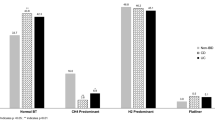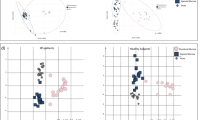Abstract
Purpose
Among irritable bowel syndrome (IBS) patients, breath methane producers overwhelmingly have constipation predominance (C-IBS). Although the most common methanogen in humans is Methanobrevibacter smithii, incidence and type of methanogenic bacteria in C-IBS patients are unknown.
Methods
By use of a questionnaire and lactulose breath testing, subjects with Rome II C-IBS and methane (>3 ppm) were selected (n = 9). The control group included subjects with IBS who had no breath methane (n = 10). Presence of bacterial DNA was assessed in a stool sample of each subject by quantitative-PCR using universal 16S rDNA primer. M. smithii was quantified by use of a specific rpoB gene primer.
Results
M. smithii was detected in both methane and non-methane subjects. However, counts and relative proportion of M. smithii were significantly higher for methane-positive than for methane-negative subjects (1.8 × 107 ± 3.0 × 107 vs 3.2 × 105 ± 7.6 × 105 copies/g wet stool, P < 0.001; and 7.1 ± 6.3 % vs 0.24 ± 0.47 %, P = 0.02 respectively). The minimum threshold of M. smithii resulting in positive lactulose breath testing for methane was 4.2 × 105 copies/g wet stool or 1.2 % of total stool bacteria. Finally, area-under-curve for breath methane correlated significantly with both absolute quantity and percentage of M. smithii in stool (R = 0.76; P < 0.001 and R = 0.77; P < 0.001 respectively).
Conclusions
M. smithii is the predominant methanogen in C-IBS patients with methane on breath testing. The number and proportion of M. smithii in stool correlate well with amount of breath methane.








Similar content being viewed by others
References
Ford AC, Spiegel BM, Talley NJ, Moayyedi P. Small intestinal bacterial overgrowth in irritable bowel syndrome: systematic review and meta-analysis. Clin Gastroenterol Hepatol. 2009;7:1279–1286.
Shah ED, Basseri RJ, Chong K, Pimentel M. Abnormal breath testing in IBS: a meta-analysis. Dig Dis Sci. 2010;55:2441–2449.
Posserud I, Stotzer PO, Björnsson ES, Abrahamsson H, Simrén M. Small intestinal bacterial overgrowth in patients with irritable bowel syndrome. Gut. 2007;56:802–808.
Manolis Pyleris, Evangelos J. Giamarellos-Bourboulis, Bassileios Koussoulas, Charalambos Barbatzas, Mark Pimentel. Small Bowel Culture Confirms the Presence of Small Intestinal Bacterial Overgrowth in a Subset of IBS Subjects. Gastroenterology. 2011; Abstract #930.
Pimentel M, Mayer AG, Park S, Chow EJ, Hasan A, Kong Y. Methane production during lactulose breath test is associated with gastrointestinal disease presentation. Dig Dis Sci. 2003;48:86–92.
Attaluri A, Jackson M, Valestin J, Rao SS. Methanogenic flora is associated with altered colonic transit but not stool characteristics in constipation without IBS. Am J Gastroenterol. 2010;105:1407–1411.
Reddymasu SC, Sostarich S, McCallum RW. Small intestinal bacterial overgrowth in irritable bowel syndrome: are there any predictors? BMC Gastroenterol. 2010;22:23.
Kunkel D, Basseri RJ, Makhani MD, Chong K, Chang C, Pimentel M. Methane on breath testing is associated with constipation: a systematic review and meta-analysis. Dig Dis Sci. 2011;56:1612–1618.
Chatterjee S, Park S, Low K, Kong Y, Pimentel M. The degree of breath methane production in IBS correlates with the severity of constipation. Am J Gastroenterol. 2007;102:837–841.
Sahakian AB, Jee SR, Pimentel M. Methane and the gastrointestinal tract. Dig Dis Sci. 2010;55:2135–2143.
Miller TL, Wolin MJ. Enumeration of Methanobrevibacter smithii in human feces. Arch Microbiol. 1982;131:14–18.
Weaver GA, Krause JA, Miller TL, Wolin MJ. Incidence of methanogenic bacteria in a sigmoidoscopy population: an association of methanogenic bacteria and diverticulosis. Gut. 1986;27:698–704.
Hwang L, Low K, Khoshini R, Melmed G, et al. Evaluating breath methane as a diagnostic test for constipation-predominant IBS. Dig Dis Sci. 2010;55:398–403.
Pimentel M, Lin HC, Enayati P, van den Burg B, et al. Methane, a gas produced by enteric bacteria, slows intestinal transit and augments small intestinal contractile activity. Am J Physiol Gastrointest Liver Physiol. 2006;290:G1089–G1095.
Fiedorek SC, Pumphrey CL, Casteel HB. Breath methane production in children with constipation and encopresis. J Pediatr Gastroenterol Nutr. 1990;10:473–477.
Soares AC, Lederman HM, Fagundes-Neto U, de Morais MB. Breath methane associated with slow colonic transit time in children with chronic constipation. J Clin Gastroenterol. 2005;39:512–515.
Pimentel M, Chow EJ, Lin HC. Normalization of lactulose breath testing correlates with symptom improvement in irritable bowel syndrome. A double-blind, randomized, placebo-controlled study. Am J Gastroenterol. 2003;98:412–419.
Ghoshal UC, Srivastava D, Verma A, Misra A. Slow transit constipation associated with excess methane production and its improvement following rifaximin therapy: a case report. J Neurogastroenterol Motil. 2011;17:185–188.
Pimentel M, Chatterjee S, Chow EJ, Park S, Kong Y. Neomycin improves constipation-predominant irritable bowel syndrome in a fashion that is dependent on the presence of methane gas: subanalysis of a double-blind randomized controlled study. Dig Dis Sci. 2006;51:1297–1301.
Low K, Hwang L, Hua J, Zhu A, Morales W, Pimentel M. A combination of rifaximin and neomycin is most effective in treating irritable bowel syndrome patients with methane on lactulose breath test. J Clin Gastroenterol. 2010;44:547–550.
Acknowledgments
We would like to thank the Beatrice and Samuel A. Seaver Foundation for their ongoing support of our research in the GI Motility Program at Cedars-Sinai Medical Center.
Conflict of interest
Dr Mark Pimentel is a consultant for and has grants from Salix Pharmaceuticals. Cedars-Sinai has a licensing agreement with Salix Pharmaceuticals. All other authors have no financial conflicts to disclose.
Author information
Authors and Affiliations
Corresponding author
Rights and permissions
About this article
Cite this article
Kim, G., Deepinder, F., Morales, W. et al. Methanobrevibacter smithii Is the Predominant Methanogen in Patients with Constipation-Predominant IBS and Methane on Breath. Dig Dis Sci 57, 3213–3218 (2012). https://doi.org/10.1007/s10620-012-2197-1
Received:
Accepted:
Published:
Issue Date:
DOI: https://doi.org/10.1007/s10620-012-2197-1




